AccessComputing News - February 2019

Below are the articles of the AccessComputing News - February 2019 newsletter. These articles can also be seen all on one page at the Full Newsletter option.
AccessComputing at SIGCSE
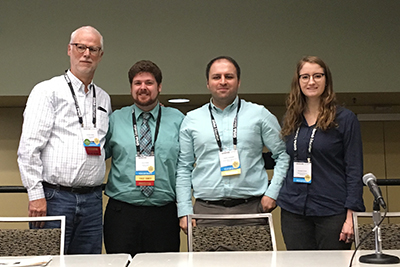
AccessComputing will be involved in several activities at the SIGCSE Technical Symposium being held February 27 – March 3, 2019 in Minneapolis, MN. Visit with AccessComputing staff and team members in the exhibit hall at the broadening participation booth (421) and check out the following sessions:
- Pre conference session: What to Teach about Accessibility - Wed, Feb 27, 2019, 1:30 pm – 5:00 pm, Hyatt: Greenway C (2nd floor)
- Birds of a Feather: Access to Computing Education for Students with Disabilities - Thu, Feb 28, 2019, 6:30 pm – 7:20 pm, Hyatt: Greenway F/G (2nd floor)
- Educational Experiences of Blind Programmers - Fri, Mar 1, 2019, 1:45 pm – 2:10 pm, Millennium: Grand South (1st floor)
- Computer Science Principles for Teachers of Blind and Visually Impaired Students - Fri, Mar 1, 2019, 2:10 pm – 2:35 pm, Millennium: Grand South (1st floor)
- Demo: Blocks4All: Making Block-Based Programming Languages Accessible for Children with Visual Impairments - Sat, Mar 2, 2019, 9:45 am – 10:35 am, Greenway H/I
- Teaching Accessibility: A Design Exploration of Faculty Professional Development at Scale - Sat, Mar 2, 2019, 10:10 am – 10:35 am, Hyatt: Greenway A (2nd floor)
While you’re at it, check out some of the other disability related sessions:
- Birds of a Feather: Supporting Computer Science Students Living with Mental Illness - Thu, Feb 28, 5:30 pm – 6:20 pm, Millenium: Grand Central (lobby level)
- Session 2J: The New NSF Requirement for Broadening Participation in Computing (BPC) Plans: Community Advice and Resources - Thu, Feb 28, 2019, 1:45 pm – 3:00 pm, Hyatt: Northstar A (2nd floor)
- Panel: Making K-12 CS Education Accessibility a Norm, not an Exception - Sat, Mar 2, 2019, 11:15 am – 12:30 pm, Hyatt: Regency (2nd floor)
- Accessible AST-Based Editing for Visually-Impaired Programmers - Fri, Mar 1, 2019, 2:35 pm – 3:00 pm, Millennium: Grand South (1st floor)
Find more details on the SIGCSE website.
AccessComputing Participant Awarded Baltimore Sun's "25 Women to Watch" and New Mobility Magazine's "5 Women Under 40 to Watch"
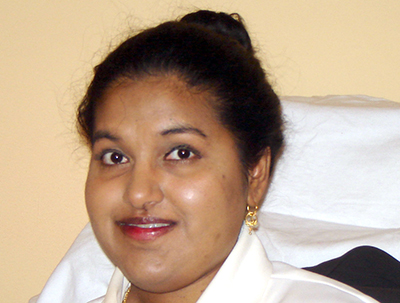
Kavita Krishnaswamy, AccessComputing Team Member and doctoral candidate at the University of Maryland Baltimore County, has been included in Baltimore Sun’s “25 Women to Watch” and New Mobility Magazine’s “5 Women Under 40 to Watch.”
“This experience was very humbling and I felt honored to have the opportunity to be recognized for making a difference in the world for positive impact," Kavita shared in response to these honors.
"I am very grateful for AccessComputing and AccessSTEM for supporting me throughout the journey of my undergraduate and graduate years in college because that allowed me to be confident in my abilities to pursue a Ph.D. in computer science and specializing in creating accessible controls for robots that can help people with disabilities and seniors. I'm also very grateful to my advisor Dr. Oates for his guidance and support to help me master the skills in machine learning and artificial intelligence. My special thanks goes to Dr. Maya Cakmak for opening the door for me to collaborate on our research project to effectively tele-operate robots with accessible web interfaces and giving the real-world experiences interacting with actual robots.”
See more on the awards at Baltimore Sun's magazine website and New Mobility's article.
AccessComputing Welcomes New Partners
We are excited to announce that three new institutional partners have joined AccessComputing: Macalester College, represented by Assistant Professor Lauren Milne; New York University, represented by Associate Professor Amy Hurts; and Wichita State University, represented by Associate Professor Vinod Namboodri. This is Lauren's first year at Macalester after graduating from the University of Washington (UW) in August 2018. Lauren is active in accessibility research while holding down a significant teaching load. Amy Hurst is a new professor at New York University with a joint appointment in the Occupational Therapy Department and the Technology, Culture and Society Department. She joined NYU after spending 8 years at the University of Maryland, Baltimore County. Vinod is an expert on mobile computing and wireless networks with a strong interest in accessibility. He runs the ACCESS Lab at Wichita State, which explores information technologies to benefit people with disabilities and older adults.
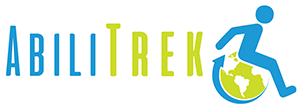
We also have a new industry partner, Abilitrek. Abilitrek is a multifaceted company with the mission of improving accessibility and empowering people with disabilities. AbiliTrek CEO Daman Wandke was an AccessComputing team member and has since hosted AccessComputing team members as interns.
We also have two new representatives. Assistant Professor Stacy Branham joins Gillian Hayes in representing the University of California, Irvine. Stacy is a graduate of Virginia Tech and formally a lecturer at the University of Maryland, Baltimore County. She is an active researcher in intersection of human-centered computing and accessible computing. Professor Jinjuan Heidi Feng will also join us, representing Towson University as Jonathan will soon be moving to the University of Maryland, College Park. Heidi is an active researcher in human-computer interaction, universal accessibility, health informatics, and accessible security.
Welcome to all our new representatives and thanks for your commitment to the goals of AccessComputing.
2018 Champions for Computer Science Awards
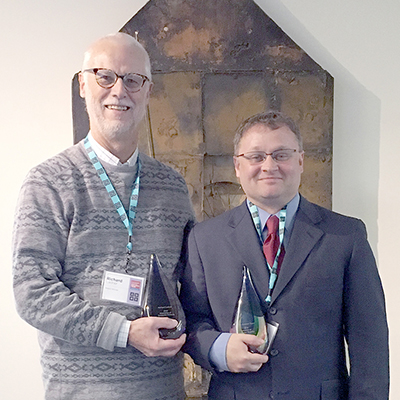
This month, AccessComputing and AccessCSforAll PI Richard Ladner and the Quorum programming language, led by AccessCSforAll PI Andreas Stefik, both received Champions of Computer Science awards from the Computer Science Teachers' Association and Code.org. The awards were presented by Melinda Gates on December 3 as part of a Computer Science Education Week (CSEd Week) kickoff program held at the University of Washington. Melinda Gates described the award as a “lifetime achievement award” with a different name, so as not to imply it is the end of their work.
As noted on the CSEd Week website, "While many organizations and programs have sought to make computer science available to all students, often it was through pathways and tools that were fundamentally inaccessible for students with disabilities." Richard and Andreas's work aims to change this.
Accessibility Pledge for K-12 Computer Science Education
The CSforALL Consortium, an organization committed to bringing computer science (CS) education to all K-12 students, has recently worked to highlight accessibility of K-12 CS education. AccessCSforAll partnered with the CSforALL Consortium on a the CSforALL Accessibility Pledge, which will rally the national community of CS education content creators, program providers, educational institutions, researchers, and investors to take immediate steps to achieve accessibility for existing efforts and ensure that future efforts address accessibility within the design phase. Over one hundred organizations have signed the pledge this far.
To learn more and read the pledge, visit the CSforALL website.
In October, the pledge and related accessibility efforts were highlighted as part of the CSforALL Summit. AccessCSforAll PIs Richard Ladner and Andreas Stefik, as well as several of our collaborators were featured. Find recordings online of the following:
- CSforALL Accessibility Pledge
- Daryl ‘Chill’ Mitchell, Actor and Accessibility Advocate
- Accessible CS in Practice
AccessCSforAll is a collaboration between the Allen School of Computer Science and Engineering, DO-IT, and the University of Nevada Las Vegas.
Accessible Computer Science Principles
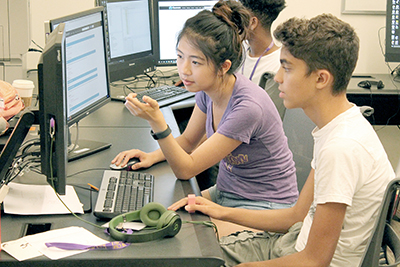
AccessCSforAll is proud to announce that we have completed an accessible version of Code.org's Computer Science Principles (CSP) curriculum that utilizes the Quorum programming language. The curriculum is accessible to all students, including those with disabilities. We've worked closely with Code.org to mirror their existing curriculum and create tools that allow students with disabilities to complete the course. We are working with the College Board to get the curriculum endorsed as an Advanced Placement (AP) CSP course.
This past summer, we held professional development for teachers of the blind and visually impaired. What we've learned from that experience led to a paper that will be presented at SIGCSE in March. In 2019, we will hold professional development for teachers from schools for the deaf and in 2020 we will hold professional development for teachers from schools that serve students with learning disabilities. Find out more about 2019 professional development on our website.
Share this information with teachers so we can get the word out. Many students with disabilities who will benefit from this curriculum are in mainstream courses. Learn more about the Quorum programming language on their website.
Accessing Higher Ground
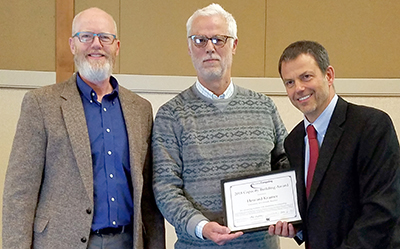
The Accessing Higher Ground (AHG) conference is designed for college and university faculty and staff to ensure that information technology procured, developed, and used at their institutions is accessible to all. At the 2018 conference, Terrill Thompson, our technology accessibility specialist, Sheryl Burgstahler, AccessComputing Co-PI, and Richard Ladner, AccessComputing PI, spoke and provided behind-the-scenes support at the conference through the following activities:
- Terrill and Sheryl engaged with colleagues from other institutions in a two-day workshop about how campuses can take steps towards increased IT accessibility.
- Sheryl presented on the design of campus IT accessibility services when the availability of resources is low, as well as on how a universal design framework might be embraced campus-wide.
- Terrill offered a workshop on accessible video design.
- Sheryl led a capacity-building institute focused on how computing faculty can incorporate accessibility content in their courses, and Terrill and Richard, who leads our AccessComputing project, presented.
- Terrill taught participants how to audio describe videos.
- Richard reported the results of a survey that sought to determine what percentage of computing faculty already teach about accessibility and shared options for doing so.
To see proceedings from the capacity building institute on teaching accessibility, visit the AccessComputing website.
AccessComputing also honored the AHG founder and director, Howard Kramer, with the AccessComputing Capacity Building Award for his efforts in drawing together leaders and newcomers in accessibility by hosting the international AHG conference for 21 years.
AccessComputing at CSUN 2019
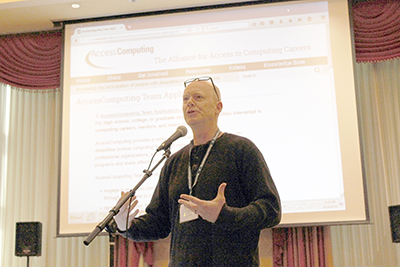
The CSUN Conference, hosted by California State University at Northridge (CSUN), is the premier international conference on technology and disability. The conference attracts thousands of researchers, practitioners, exhibitors, end users, speakers and other participants to share knowledge and promising practices related to assistive technology and technology accessibility. The 34th Annual CSUN Assistive Technology conference will take place March 11 through 15, 2019.
This year, the conference will be moving to Anaheim, California. Consistent with prior years, AccessComputing will have a presence at the conference, helping to staff the DO‑IT booth in the exhibit hall, where they will be distributing resources and be available throughout the conference to answer questions and discuss issues related to project goals.
DO-IT will be giving three presentations. Sheryl Burgstahler and Terrill Thompson will be presenting on 'Teaching Accessibility topics in computing curriculum," while colleague Hadi Rangin will be giving two presentations: "Internet2 NET+: a new vehicle to drive accessibility and universal design" and "Accessibility training for IT vendors: a new model to reach accessibility."
Additional information about the CSUN Conference is available online.
Distributed Research Experiences for Undergraduates
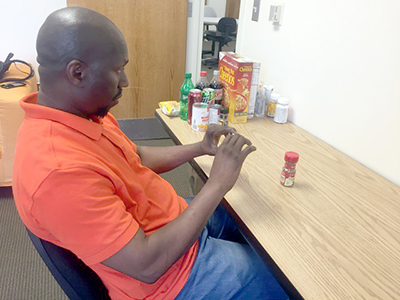
I am blind, a father of three daughters, a non-traditional student, and a senior at University of Maryland (UMD), College Park majoring in information science at the UMD iSchool hoping to specialize in human-computer interaction in graduate studies. I value education not only in the practical sense but also for how it shapes me as a person and allows me to contribute to our society.
This summer, I participated in the Distributed Research Experiences for Undergraduates (DREU) program, a summer internship program supporting female and underrepresented students. I found out about this opportunity from Dr. Hernisa Kacorri, an Assistant Professor at UMD. I was interested in her research on accessibility and wanted to work with her over the summer. After expressing my interest, she invited me to join her research lab, the Intelligent Assistive Machines (IAM) Lab, and she directed me to AccessComputing.
This project is very close to my heart as it allows me to contribute to novel assistive technologies that can improve the lives of people with visual impairments. It was also a fun project that gave me the opportunity to interact with graduate students and learn how to conduct research.
My task involved helping with the design and implementation of the data collection process that will serve as a benchmark for our machine learning algorithms. This involved engineering the stimuli and all possible variables for photo taking of everyday objects by blind users. I contributed to the first dataset that is currently being replicated. This dataset plays an important role in the project as it will be used to train and test computer vision models to be incorporated in a wearable or mobile device as a teachable objection application for blind users. Specifically, blind participants will be training the mobile application with snapshots of object of interest and can provide custom labels as well as object descriptions through audio.
Prior studies show that there are many benefits for people who are blind and visually impaired living in their own homes rather than assisted living facilities. We are hoping that the assistive technologies from this project will help in this direction.
I had an awesome experience working as a team member of such a diverse group. Working with graduate students and hearing their stories post-undergrad was very rewarding and eye-opening. It was also a great networking experience as I attended research talks and got to discuss with research visitors about their work. Specifically, I would like to thank Dr. Kacorri for setting up a meeting with Ali Abdolrahmani. Ali was the first blind Ph.D. student that I have met. Not only were our discussion fruitful, but also through him I got introduced to an entire network of blind researchers.
I had an excellent time working at the IAM Lab. I owe this to many people, including AccessComputing. This alliance has helped me in so many ways, and I would recommend any fellow student who is blind or visually impaired to join them.
Also, finding a reader or scribe right before the summer is hard. Students often leave for summer vacations or internships. I would recommend reaching out early on.
Being able to do what I love for an entire summer has been a priceless experience. Through this program, I learned technical skills such as programming in HTML and LaTeX as well as analytical thinking, reading scholarly articles, and experimental design processes.
The DREU internship program has helped me accomplish my goals in gaining research experience and pursuing research opportunities for future graduate studies. And why stop at a master’s degree? Initiatives like AccessComputing empower students like me to dream further and leverage their life experiences to make a better world. Hopefully, next time you hear from me, I will be a Ph.D. student.
Recent Videos from AccessComputing
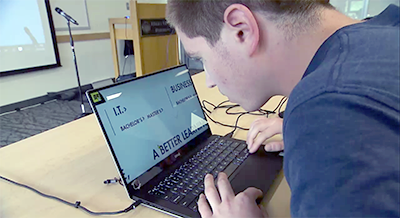
If you haven’t seen them, check out these recent videos from AccessComputing:
- Teaching Accessibility: Including Accessibility in Your Courses
There are multiple strategies that can be used to teach about accessibility in computing courses. Exposing students to this information can help them create more accessible products throughout their careers. - Our Technology for Equal Access
This video highlights participants, who share information about the technology they use to access school, work, and the community.
Find a plethora of other videos that talk about accessible computer science education, disability disclosure in employment, and more.
ASSETS 2018 Conference on Computers and Accessibility
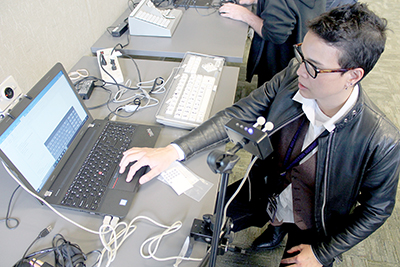
AccessComputing affiliates were prominent in both attending and publishing at the 20th International ACM SIGACCESS Conference on Computers and Accessibility held from October 21-24, 2018 in Galway, Ireland. This conference, known succinctly as “ASSETS,” is the premiere forum for disseminating research results in the field of accessible computing. ASSETS brings together experts from around the world who do research, teach, and advocate on topics related to technology and people with disabilities. Many of the scientists and inventors who attend ASSETS are people with disabilities, adding a degree of insight, authenticity, and expertise to the conversations at the conference. The conference also attracts a thorough mix of professors and students, as well as research scientists from industry. For example, multiple researchers from Microsoft Research, an AccessComputing partner, were in attendance, including Meredith Ringel Morris and Ed Cutrell.
In fact, AccessComputing members were in strong attendance in general. From the University of Washington, professors Richard Ladner and Jacob O. Wobbrock were there. Professors from partner universities were also in attendance, including Kristen Shinohara and Matt Huenerfauth from the Rochester Institute of Technology; Kyle Rector from the University of Iowa; Shaun Kane from the University of Colorado Boulder; Shiri Azenkot from Cornell Tech; and Jeffrey Bigham from Carnegie Mellon University, among many others. The ASSETS 2018 proceedings were chock-full of research publications from AccessComputing members as well. In fact, about 20 of 35 papers at the conference had at least one author affiliated with AccessComputing! Clearly, there are too many to list here, but here are some highlights by AccessComputing affiliates:
- The 2018 Best Paper award went to “Modeling the Speed and Timing of American Sign Language to Generate Realistic Animations” by Sedeeq Al-khazraji, Larwan Berke, Sushant Kafle, Peter Yeung, and Matt Huenerfauth.
- The 2018 Best Student Paper went to “Interdependence as a Frame for Assistive Technology Research and Design” by Cynthia Bennett, Erin Brady, and Stacy Branham.
- A Best Paper nominee was “ ‘It Looks Beautiful but Scary’: How Low Vision People Navigate Stairs and Other Surface Level Changes” by Yuhang Zhao, Elizabeth Kupferstein, Doron Tal, and Shiri Azenkot.
- Another Best Paper nominee was “Exploring the Data Tracking and Sharing Preferences of Wheelchair Athletes” by Patrick Carrington, Gierad Laput, and Jeffrey Bigham.
These highlights are just a few of the standout papers with AccessComputing-affiliated authors at the conference. They, and many other affiliated papers, demonstrate the strong commitment to developing and improving accessible technologies by affiliates of AccessComputing. They also represent a glimpse into the future, fitting for a conference that was held in one of Europe’s westernmost towns, with wide-open views of unending ocean stretching out to infinite possibilities. ASSETS 2018 in Galway, Ireland, will surely be one to remember!
My Research on Haptics and Wearable Computing
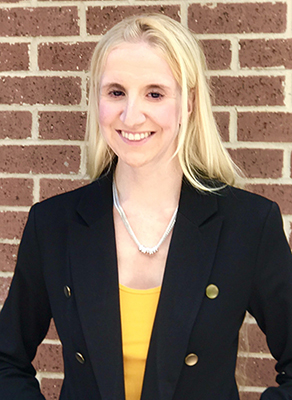
I am currently a Ph.D. student in human-centered computing at the Georgia Institute of Technology. I chose to pursue this degree when I discovered that I could combine my passion for scientific discovery with my love of engineering. My undergraduate degree is in electrical engineering, which allowed me to work with my hands and build new technologies. Now, I apply those skills to create and study new computing devices for learning and rehabilitation.
I have savored the process of pursuing a doctorate. The process has taught me how to take my skills (such as writing code) and knowledge (such as different types of signal filters) and apply them to answer very narrow scientific questions and engineering problems.
My research focuses on wearable computing and haptics. In my work, I create systems such as a stimulation device for stroke recovery or a tactile system to teach braille. The work aims to address real-world problems while developing new techniques and answering scientific questions. For example, I challenged the Braille Literacy Crisis by creating a pair of computerized gloves that teach braille using tactile taps and a new stimulation technique. There are many considerations in this area, ranging from physical comfort and accessibility to algorithms for context-awareness. In turn there are many advantages—small, wearable devices can interact directly with the body, be always on or available, allow multitasking, and gather unique data.
As part of my doctoral work, I also advise and mentor students in research. As a member of AccessComputing, it is important to me to help other students succeed. I make it clear that my lab is an inclusive environment, and that people with all different stories are welcome and appreciated here. The way students shine is through their curiosity, dedication, and energy.
Going to the Tapia Conference
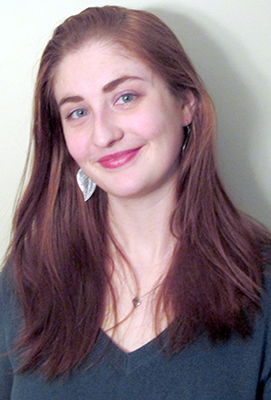
I am a doctoral candidate at Virginia Tech exploring how disability is discussed within institutions of higher education. I share a lot about me and my studies on my blog. I was interested in attending Tapia this year to share how the group I work with, Accessible Technologies, made strides this year with two internal campaigns to get the message across to all people working or attending Virginia Tech that accessibility is an achievable goal. For 2018-2019, we are focused on addressing captioning and color contrast issues with professional development and easy-to-follow guides. We have promoted these campaigns to faculty, staff, and students, urging them to “Keep C.A.L.M. (Choosing Accessible Learning Materials)” in their own work.
My favorite parts of the conference were sharing my own experiences during the “Welcoming Students with Disabilities” panel and getting to know other attendees. While working at the booth with others from AccessComputing, I got to know people who I had only associated with names on papers or emails. I also got to know a great new friend and doctoral student from University of Florida, Rua Williams; we now can collaborate and push each other to submit our work to different conferences and journals because we can share that information! This new friendship demonstrates why networking is such an important part of going to a conference. Getting to know new people who are interested in your work is both thrilling and overwhelming—it’s okay to be excited!
To those who have never previously been to a conference, I would suggest checking the schedule of events before getting to the conference. This is important for a variety of reasons: you can decide what panels or presentations you want to attend, figure out how to travel between rooms, and make sure you plan time for meals. Knowing the schedule helps you plan.
Using the schedule will also let you figure out a few names of people whose work you think is interesting. You might want to research their other work ahead of time. You might want to come up with a game plan to introduce yourself. Getting to know people at a conference is not like an interview, so don’t put too much pressure on yourself!
I’d also like to leave you with some thoughts on conference accessibility. I’ve always found that I have a better conference experience when I request that my access needs be met, instead of trying to ignore them. Supporting others with their requests also helps organizers recognize that accessibility is a broader issue beyond ramps and stairs. Considerations such as how rooms are laid out, the presence of microphones, captioning, lighting, food—it all goes into planning. This can be difficult for those unfamiliar with accessibility, which is why the Gender, Bodies, and Technology group reached out and enlisted me as the Accessibility Coordinator for their 2019 conference. Networking with people and my experiences at different conferences led to this opportunity for me to use my knowledge and skills to benefit a larger group. What could going to conferences bring you?
OurCS@UW+AccessComputing
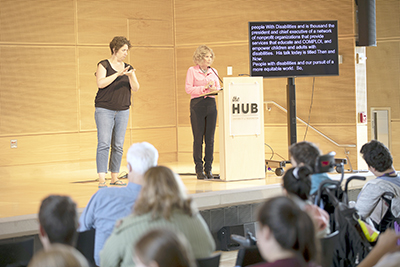
OurCS@UW+AccessComputing is a two-day research-focused workshop for undergraduate women with disabilities in computing fields to be held Thursday, April 11 – Saturday, April 13 at the University of Washington. Female students with disabilities nationwide in computing fields are eligible to apply. Students will participate in group research projects designed to inspire participants to consider research careers and learn about faculty and graduate student mentors' current research.
Transportation, housing, and meals will be provided for participants. Funding is provided by Google Explore CSR, the Paul G. Allen School of Computer Science & Engineering, and AccessComputing.
The application deadline has passed, but applications will still be considered as space allows. Apply now!
Renewed Support for the Expanding Computing Education Pathways Alliance
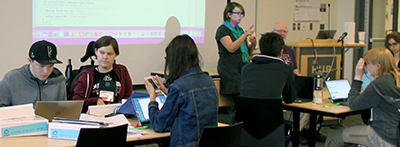
The National Science Foundation renewed its support for the Expanding Computing Education Pathways alliance (ECEP), adding six new states: Washington, Oregon, Minnesota, Ohio, Hawaii, and Mississippi. The alliance's mission is to create a network of K-12 computer science education advocacy teams, with a particular focus on equitable access and engagement, including for students of all abilities. The alliance website (ecepalliance.org) contains numerous materials for streamlining both political advocacy, as well as grassroots professional development and pre-service teacher education efforts.
The Washington State team, led by Professor Amy J. Ko in the University of Washington Information School, and named CS for all, also includes leadership from Microsoft TEALS, the state's Office of the Superintendent of Public Instruction, the Puget Sound Computer Science Teachers Association, the state's networks of Educational Service Districts, and Pacific Northwest National Laboratory, which has a long tradition of supporting STEM education efforts. One of the team's goals is to launch a network of pre-service CS teacher education programs that place equity at the center of teacher learning.
My Tapia Experience
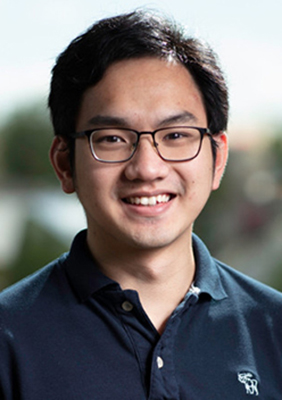
I'm currently a senior computer science major at Williams College, Massachusetts. My school is located in a very rural area; as a result, there are very few students with disabilities here and minimal support for us.
I applied to attend Tapia in hope of connecting with other students who are in my shoes, and find resources. Before the conference, I was excited to connect with AccessComputing, who helped provide support and funded my attendance at Tapia.
The highlight of my trip was the panel with a number of disabled students sharing about their experiences navigating both academics and industry. It was reassuring to learn about all the support available for us, and to know that there are others who could identify with my experiences. It was also amazing to connect with so many talented individuals.
For students who are considering attending a conference, I would say that they should not hesitate to reach out to AccessComputing; I received a lot of support from the staff, and also learned a lot from other students on the listserv who care to share their tips and advice.
About AccessComputing
Led by the Paul G. Allen School of Computer Science & Engineering, the Information School, and DO-IT (Disabilities, Opportunities, Internetworking, and Technology) at UW, AccessComputing is supported by the National Science Foundation (NSF) (Grant #CNS-0540615, CNS-0837508, CNS-1042260, CNS-1539179). Any opinions, findings, and conclusions or recommendations expressed in this material are those of the authors and do not necessarily reflect the views of the NSF. For further information, to be placed on the mailing list, request materials in an alternate format, or to make suggestions for project publications or web pages, contact us:
AccessComputing
University of Washington
Box 354842
Seattle, WA 98195-4842
accesscomp@uw.edu
www.uw.edu/accesscomputing/
206-685-DOIT (3648) (voice/TTY)
888-972-DOIT (3648) (toll free voice/TTY)
206-221-4171 (FAX)
AccessComputing Principal Investigators:
Richard Ladner, PI
Sheryl Burgstahler, Co-PI
Amy J. Ko, Co-PI
Jacob O. Wobbrock, Co-PI
Brianna Blaser, Project Coordinator
Kayla Brown, Project Coordinator
Lyla Crawford, Internal Evaluator